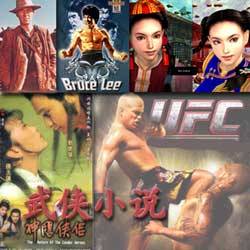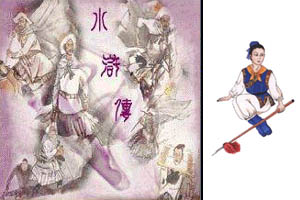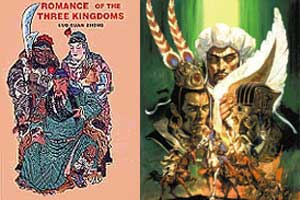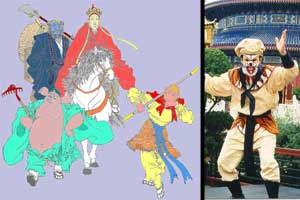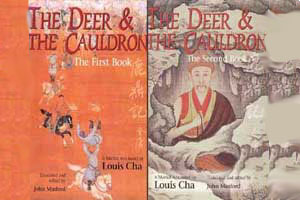
| Home | |||
| About Us | |||
| Overview | |||
| History | |||
| Women | |||
| Philosophy | |||
| Practice | |||
| References | |||
| Shaolin | |||
| Hsing Yi | |||
| Tai Chi | |||
| Bagua | |||
| Baji | |||
| Health | |||
| Other Styles | |||
|
|
|||
| Links | |||
| Directory | |||
| News | |||
artial arts are now an integral part of popular culture. However, there is a distinctive difference between the ideas expressed in the East and the values being adapted in the West. It is interesting to understand how those subtle differences affect the public's present perception and the future of Chinese martial arts.
This section examines how Chinese martial arts are described and perceived in popular media such as fiction, movies and video games.
1. Wuxia - the Chinese Martial Arts Fiction
2. Comics, Theatre and Television - Then and Now
3. Bruce Lee and Heroic Cinema
4. Sports, Blood Sports and the Mixed Martial Arts
5. Video Games and the New Arm Chair Warriors
Wuxia - the Chinese Martial Arts Fiction
|
"He is honest in words, effective in action, faithful in keeping promises, fearless in offering his own life to free the righteous from bondage."
Sima Qian (¥q°¨¾E,145-86 BC) |
uxia (ªZ«L), translated as Martial (meaning fighting or military related) Chivalry, is a writing genre specific to the Eastern culture. wuxia fiction is translated as martial-chivalric fiction. They include historical dramas such as "Outlaw of the Marsh" and "The Romance of the Three Kingdoms", fantasy's such as "Journey to the West", as well as purely entertaining books such as those produce by Xiong Yaohua (1937-1985), Liang Yusheng and Jin-Yong. Each Wuxia novels have elements that reaffirms traditional Confuscian values: humanity (jen), loyalty (zhong), bravery (yong), righteousness (yi) and principles (li) as well as elements of Taoism and Buddhism. The writing can include romance, fighting, socery or mystery. Central elements of the Wuxia novels include:
A hero (or anti hero), Xia («L), can be translated as a "knight" or a "scholar warrior" who live the life as a martial artist. The xia were often wanderers seeking adventure, but greed and self-interest was not always their motivation. A true xia stands apart from other men with fighting skills because of their commitment to their way of life, their ideology and a firm code of conduct. They also have elements of the anti-hero, since they generally operate outside society and obeys their own rules and ethics. They are often scholar warriors that value action over contemplation.
- A separate community known as Rivers and Lakes (Jianghu, ¦¿´ò) that operates on the fringes of society. This term is often used in the colloquia to denote a parallel world that includes secret societies, merchants, brotherhoods and elements that are not part of normal society.
- The martial arts community known as Wulin (ªZªL ) - martial forest - is part of Jianghu but focus on the actions of those that practise the martial arts. They include soldiers, teachers, body guards, monks, taoists and other elements of society.
Typical themes for such novels include:
A journey or a goal that test the character and the martial powess of the hero as he travel through Jianghu · Revenge for some major affront (lost of family, lost of lover, etc.)
- The search for a teacher, secret technique or manuscript
- The order and control of Wulin
- An emphasis on brotherhood, humanity, integrity and other "noble" sentiments
- Certain mystical or mysterious sources involving spiritual elements or chi gong that results in supera human abilities
This type of literature is extremely popular in Chinese societies and are continuing to evolve. In Japan, the stories are modified to become samurial epics. In a modern setting, the sword and sorcery aspects are replaced by guns and the techniques of gambling. Jianghu and Wulin became the underworld and the secret societies of the triads. This genre also been adapted to comics, movies and now video games. It has becoming an important force shaping popular culture. Unfortunately, only portions of this rich heritage are being past down. The aspects of martial powess are quickly adapted but the nobler sentiments have not been emphasized.
Recomended Wuxia
The Water Margin (¤ôâq¶Ç) also known as "Tales of the Water Margin" and "All Men are Brothers" was written in the fourteenth century by Shi Nai'an and Luo Guan Zhong. The story takes place in the final years of Emperor Hui Zhong's reign (Song Dynasty, 1101-1125). It tells the tale of 108 virtuous men and women who became "outlaws" because of the oppression corrupt officials Romance of the Three Kingdoms (¤T°êºt¸q) was originally a set stories told by story tellers before being compiled into a written novel of over 750,000 characters by Luo Guan Zhong in the fourteenth century. It is a historic epic of the Three Kingdoms Period (168-265 A.D) where three states battle for the control of China Journey to the West (¦è¹C°O) was written in the sixteenth century by Wu Ch'eng-en. It tells the story of Tripitaka, a Buddhist priest, who travelled from China to India to obtain sacred scriptures. Tripitaka is accompanied on his journey by three special disciples. The most famous and senior of these is Monkey, an immortal monkey spirit who is the archetype prankster of Chinese mythology. The Deer and the Cauldron (³À¹©°O) written by Louis Cha (Jin Yong). It tells the story of Trinket, an irreverent and comic anti-hero, and his adventures through China over more than twenty years at the beginning of the Qing dynasty.
References
[1] An Introduction to Wuxia, Eric Yin, 2001 [2003/03]
[2] Martial Arts Movies and TV Series - Wu Jing [2003/03]
[3] Wuxia World (ªZ«L¥@¬É) in Chinese [2003/03]
Copyright 2003
